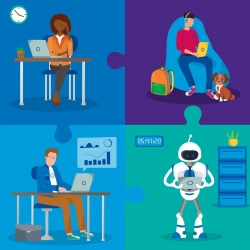To provide the best experiences, we use technologies like cookies to store and/or access device information. Consenting to these technologies will allow us to process data such as browsing behaviour or unique IDs on this site. Not consenting or withdrawing consent, may adversely affect certain features and functions.
The technical storage or access is strictly necessary for the legitimate purpose of enabling the use of a specific service explicitly requested by the subscriber or user, or for the sole purpose of carrying out the transmission of a communication over an electronic communications network.
The technical storage or access is necessary for the legitimate purpose of storing preferences that are not requested by the subscriber or user.
The technical storage or access that is used exclusively for statistical purposes.
The technical storage or access that is used exclusively for anonymous statistical purposes. Without a subpoena, voluntary compliance on the part of your Internet Service Provider, or additional records from a third party, information stored or retrieved for this purpose alone cannot usually be used to identify you.
The technical storage or access is required to create user profiles to send advertising, or to track the user on a website or across several websites for similar marketing purposes.
 Just as everybody thinks they are a better than average driver or more intelligent than average, a new survey from HR and payroll software provider Ciphr suggests that employees self-rate their own productivity far higher than they rate other people’s productivity levels. They also think that people working in HR, marketing, and senior management roles are the least productive. According to the poll, UK employees perceive HR teams as being particularly unproductive, compared to other colleagues and departments in their organisations. More →
Just as everybody thinks they are a better than average driver or more intelligent than average, a new survey from HR and payroll software provider Ciphr suggests that employees self-rate their own productivity far higher than they rate other people’s productivity levels. They also think that people working in HR, marketing, and senior management roles are the least productive. According to the poll, UK employees perceive HR teams as being particularly unproductive, compared to other colleagues and departments in their organisations. More →











 You don’t have to look far to find misinformation. Just a few weeks ago, amid the aftermath of the coup in Niger, online platforms were being
You don’t have to look far to find misinformation. Just a few weeks ago, amid the aftermath of the coup in Niger, online platforms were being 





















December 19, 2023
Flexible working is delivering the gift of seasonal productivity
by Frank Weishaupt • Comment, Flexible working, Technology